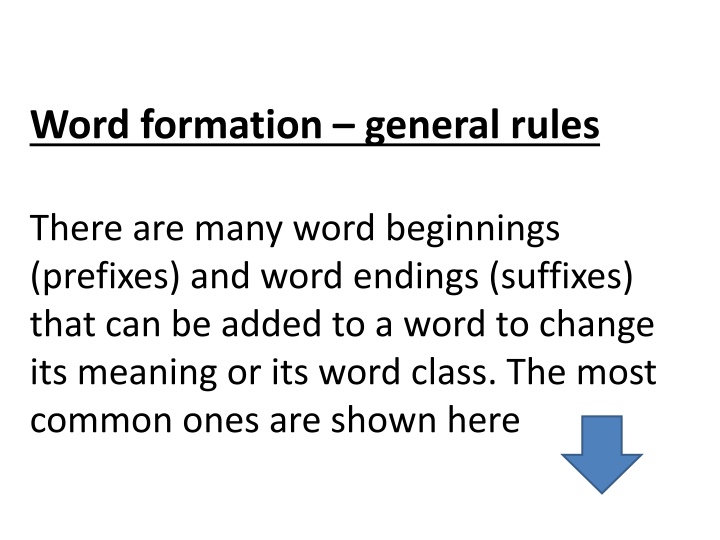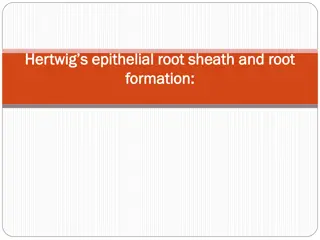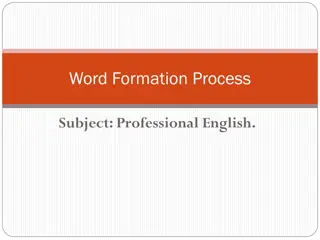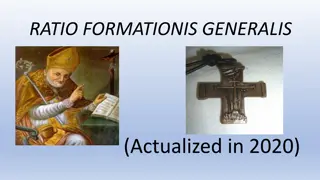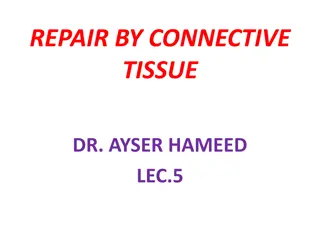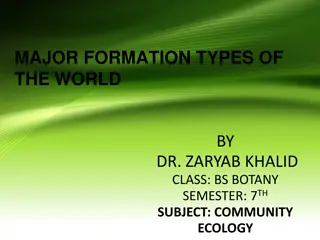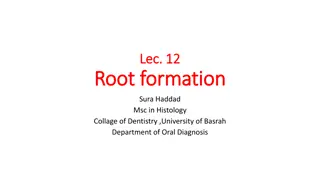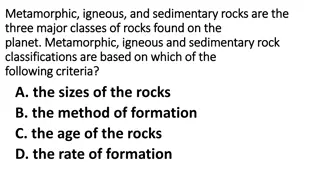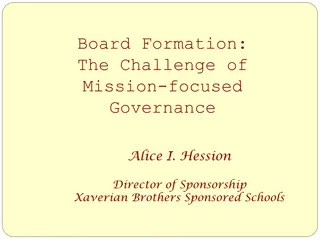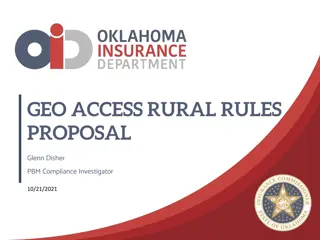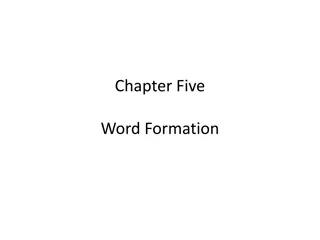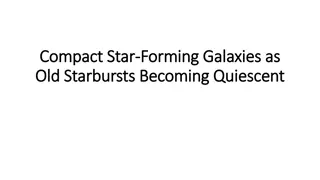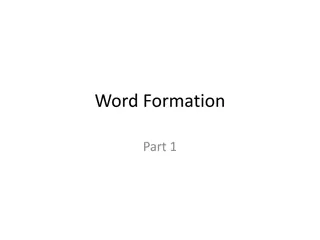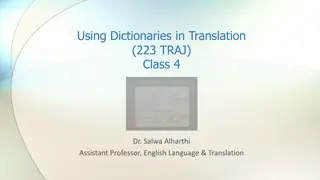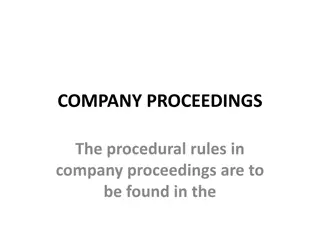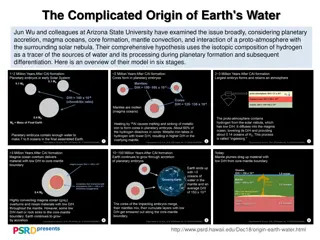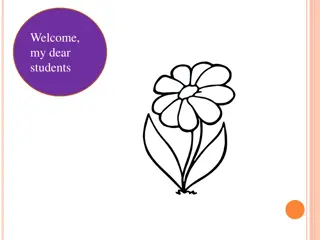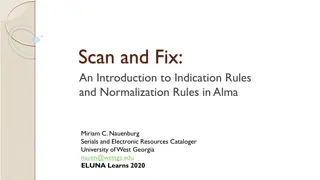Word Formation Rules and Examples
Explore the general rules of word formation, including prefixes and suffixes used to modify meanings and word classes. Learn how to create verbs, adverbs, nouns, adjectives, and more through the addition of specific endings to base words.
Download Presentation

Please find below an Image/Link to download the presentation.
The content on the website is provided AS IS for your information and personal use only. It may not be sold, licensed, or shared on other websites without obtaining consent from the author.If you encounter any issues during the download, it is possible that the publisher has removed the file from their server.
You are allowed to download the files provided on this website for personal or commercial use, subject to the condition that they are used lawfully. All files are the property of their respective owners.
The content on the website is provided AS IS for your information and personal use only. It may not be sold, licensed, or shared on other websites without obtaining consent from the author.
E N D
Presentation Transcript
Word formation general rules There are many word beginnings (prefixes) and word endings (suffixes) that can be added to a word to change its meaning or its word class. The most common ones are shown here
Verb Formation The endings ize and ify can be added to nouns and adjectives to form verbs. Noun + ize = Verb American + ize = Americanize Legal + ize = legalize This will make the factory more modern. This will modernize the factory. Adjective + ize = Verb False + ify = Falsify Humid + ify = humidify These tablets make the water pure. They purify the water.
Adverb Formation The ending ly can be added to most adjectives to form adverbs. Adjective + ly = Adverb Easy + ly = easily His behaviour was stupid. He behaved stupidly .
Noun Formation The endings er, ment, and ation can be added to many verbs to form nouns. Verb + er = Noun Fasten + er = faster Open + er = opener John drives a bus. He is a bus driver.
Amaze + ment = amazement Retire + ment = retirement Children develop very quickly. Their development is very quick.
Admire + ation = admiration Organize + ation = organization The doctor examined me. The doctor gave me an examination.
The endings ity/ty and ness can be added to many adjectives to form nouns. Stupid + ity = stupidity Don t be so cruel. I hate cruelty
Adjective Formation The endings y, ic, ical, ful, and less can be added to many nouns to form adjectives. The ending able can be added to many verbs to form adjectives. Noun + y = Adjective Dirt + y = dirty That was an awful smell. It was very smelly. Atom + ic = atomic That was a book of poetry. It was a poetic book. Hope + ful = hopeful His broken leg caused pain. It was very painful.
Care + less = careless The operation didn t cause pain. It was painless. Verb + able = Adjective Love + able = lovable You can wash this coat. It s washable.
Opposites Prefixes added to the front of many words can produce an opposite meaning. un + fortunate = unfortunate I m not very happy. In fact I m very unhappy In + efficient = inefficient iIl + literate = illiterate Im + possible = impossible De + centralize = decentralize Instead of inflating the tire, he deflated it. dis + honest = dishonest I don t agree with everything you said. I disagree with the last part. non + payment = non-payment You are not making any sense. What you are saying is nonsense.
Exercises 1 Give three examples of nouns beginning with the negative prefix dis-. 2 What two different verb forms can be made from the word light? 3 Make four different words from the root word communicate. 4 Give three examples of adjectives ending in -ous.
5 Make four different words from the root word success. 6 What negative prefix is used before all of these words: kind, do, employment? 7 Give three examples of adjectives beginning with the negative prefix im-. 8 Give three examples of nouns ending in - dom.
1.Give three examples of nouns beginning with the negative prefix mis-. 2. What two different noun forms can be made from the word able? 3.Make four different words from the root word approve. 4.Give three examples of adjectives ending in - ive
5.Make four different words from the root word predict. 6.Give three examples of adverbs spelt with a double l at the end. 7.What negative prefix is used before all of these words: ability, sensitive, tolerance? 8.Give three examples of nouns ending in - ship.
Try to write similar sentences Mr Successful succeeded in successfully completing the task that had so far been very unsuccessfully dealt with, which was a great success.
KEY: sample answers 1 disappointment, dissatisfaction, disloyalty 2 lighten, enlighten 3 communicative, uncommunicative, communicator, communication 4 famous, marvellous, autonomous 5 successful, unsuccessful, succeed, successor 6 un 7 impolite, improbable, impossible 8 freedom, stardom, boredom 1 misbehaviour, misinterpretation, mistrust 2 ability, disability 3 approval, disapproval, disapprove, disapprovingly 4 talkative, formative, creative 5 predictable, unpredictable, prediction, predictably 6 formally, faithfully, fully 7 in 8 friendship, relationship, sponsorship
Useful links http://home.agh.edu.pl/~potrec/Exam%20B2/ Wordformation/WORD%20FORMATION.pdf https://www.youtube.com/watch?v=IRNEUPXl ObY&t=38s http://corsi.unica.it/pas/files/2014/03/PAS- FODDE-WORD-FORMATIONS-B1-B2.pdf
